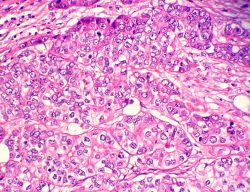Researchers Find Potential Target to Improve Immunotherapy in Triple Negative Breast Cancer
 Breast Medullary Carcinoma Triple Negative. Courtesy of Creative Commons, Sarahkayb.
Breast Medullary Carcinoma Triple Negative. Courtesy of Creative Commons, Sarahkayb.
Researchers at Boston University School of Medicine (BUSM) have identified the inhibition of BET proteins as a promising strategy to improve Immunotherapy, a treatment that boosts the body’s natural immune defenses to fight cancer, in triple-negative breast cancer (TNBC).
TNBC is a subtype of breast cancer that is highly aggressive. It responds poorly to the current therapeutic options, resulting in a poor prognosis for individuals. Previous research identified specific signaling pathways, such as the PD-1/PD-L1 pathway, are important targets to restore the body’s immune response against cancer cells. The BET protein family has been shown to be involved in metastatic forms of TNBC, and the proteins now also appear to have a promising role in the regulation of PD-1/PD-L1 pathway.
BUSM researchers used TNBC cell lines to test the effects of BET protein inhibition on the PD-1/PD-L1 pathway. By blocking BET proteins, authors observed that cancer cells as well as immune cells had decreased ability to participate in the PD1/PD-L1 pathway, which resulted in pathway suppression and improved immunity against tumor cells.
These results suggest that BET proteins are important regulators of the PD-1/PD-L1 pathway in TNBC cells. BET protein inhibition is a promising strategy to overcome suppression of the body’s immune system in TNBC and improve the immune response against tumors.
“Our findings, which appear in Sneak Peek for Cell Reports, are exciting because current therapy options for triple-negative breast cancer are very limited. BET protein inhibition is an important approach that could improve immunotherapy in this aggressive type of breast cancer,” explained Gerald V. Denis, PhD, associate professor of pharmacology and medicine.
Submitted by Clare Ronan, MD.
View all posts